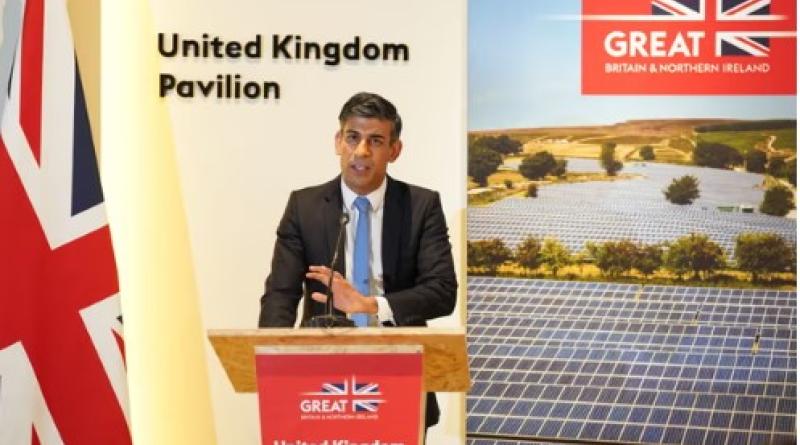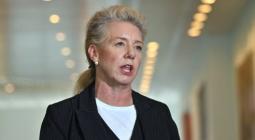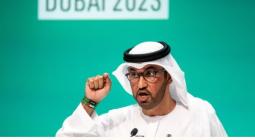UK likely to miss Paris climate targets by wide margin, analysis shows

The UK government is likely to miss its targets under the Paris climate agreement by a wide margin, analysis shows, dealing a devastating blow to Britain’s standing on the international stage.
Under current policies, the UK’s greenhouse gas emissions are likely to be 59% lower in 2030 than they were in 1990 – but the country’s internationally agreed target is for a 68% reduction by the end of this decade. The gap is likely to leave Britain in breach of these commitments.
The 2030 emissions goal was agreed at Cop26, the UN climate summit hosted by the UK in Glasgow in 2021, and has been reaffirmed at Cop28, taking place in Dubai this week.
Failure to meet the UK’s commitments would hinder international efforts to limit global temperature rises to 1.5C (2.7F) above pre-industrial levels.
The estimate comes from analysis of publicly available and government data carried out by Friends of the Earth. It found that current policies would achieve just over half the emissions cuts needed by 2030.
The gap had grown significantly under Rishi Sunak’s leadership, Friends of the Earth found.
The conclusions echo the concerns of the Climate Change Committee (CCC), which found in September that U-turns made by the British prime minister on important aspects of net zero policy – including delaying the phase-out of diesel and electric cars and of oil boilers, and the scrapping of some proposed measures on home insulation – would make it more difficult for the UK to meet its climate targets.
Danny Gross, a campaigner at Friends of the Earth, said: “Despite the prime minister’s repeated assurances, the UK’s 2030 climate commitment is seriously off-track – and that gap has grown significantly under Rishi Sunak’s leadership.
“The fact remains that you can’t approve new fossil fuel projects, max out North Sea oil and gas and roll back vital green policies while staying committed to our climate targets – it’s one road or the other.”
The UK has two sets of climate goals: the statutory carbon budgets, set out for more than a decade in advance by the CCC, with the current budgets running to 2037; and the UK’s target under the Paris agreement, known as nationally determined contributions (NDCs), which is pegged to emissions cuts by 2030.
Pledges on emissions cuts under the Paris pact are not legally binding – the treaty itself is, but the pledges come in a non-binding annexe. However, to renege on them would be regarded as a significant concern.
Strengthening the UK’s NDCs was a crucial plank of the Cop26 conference, announced with fanfare by Boris Johnson. The former prime minister, who would have attended Cop28 were it not for his appearances at the Covid inquiry, is known to have deep concerns about Sunak’s handling of climate action.
A senior ally of Johnson’s said: “Making progress on this hugely important agenda is all about consistency. It is of critical importance that the UK remains a world leader in this effort.”
Sunak said repeatedly at Cop28 the UK was leading the world on cutting emissions. But those claims are based on reductions made decades ago, when Britain shifted from coal to gas in the 1990s and 2000s.
The rate of emissions decline has slowed, and factors such as the increasing popularity of SUVs, failure to insulate homes and the slow deployment of windfarms and solar power in England have hampered further cuts.
When countries make changes of policy that could have an impact on their commitments, they are expected to update their NDCs, lodged with the UN. For developed countries, these updates are expected to be a strengthening – a process agreed in Glasgow known as the “ratchet” under the Paris agreement – unless they are stricken by a natural or economic disaster.
Representatives of developed and developing countries at Cop28 said if a large economy such as the UK were to deviate from its NDCs without strong reason it would be regarded as a serious breach of its pledges.
Gross said there was still time for Sunak to change his policies. “With just seven years to meet the pledge, and still no credible climate strategy in place, our future is looking increasingly uncertain. And yet there’s still time to get things back on course with bold and ambitious leadership that recognises the scale and pace of change required,” he said.
“That starts with a fully fledged climate action plan. One that can genuinely deliver our 2030 target and ensure a green transition that we can all benefit from – in the way of lower energy bills, long-term sustainable jobs and a healthier planet.”
Wera Hobhouse, the Liberal Democrat climate spokesperson, said: “That the government will only reduce half of the emissions needed to meet our 2030 climate targets is very alarming. Interim targets matter; the sooner we cut emissions – now, rather than in 20 years’ time – the better.
“Rishi Sunak is gambling away our future for what he hopes will help the Conservatives win votes at the next election. I hope voters will see through this reckless and hugely irresponsible game.”
Sunak attended Cop28 for barely 12 hours on Friday, in sharp contrast to most other leaders of developed countries, who stayed for two or three days.
Keir Starmer, the leader of the Labour party, spent three days at the UN summit, meeting figures including the UN secretary general, António Guterres, the US presidential envoy, John Kerry, the former secretary of state Hillary Clinton, the former US vice-president Al Gore, and the Barbados prime minister Mia Mottley, one of the most prominent voices on climate finance in the developing world.
Starmer, speaking to the Guardian, accused Sunak of using the UK’s past performance as a “shield” from having to talk about his emissions plans.
A Department for Energy Security and Net Zero spokesperson said: “This report is inaccurate and ignores the fact we’ve overdelivered on every target to cut our emissions to date. We will continue to meet our ambitious 2030 targets and international commitments under the Paris agreement, while also giving families more time to make the transition, saving them thousands of pounds at a time when the cost of living is high.”






